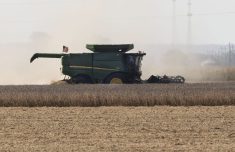Beekeepers in Central Canada want a ban on neonicotinoid insecticides in field crops.
This morning, the Ontario Beekeepers Association and the Federation des apilcultueurs de Québec announced they are working together to ban neonicotinoids, which are widely applied as seed treatments on corn, soybeans and canola, before the 2014 planting season.
Earlier this year, the European Union suspended the use of three neonicotinoids for seed treatment, soil and foliar application on bee attractive crops and cereals after scientific studies suggested the insecticides were responsible for widespread bee losses.
Read Also

Alberta harvest wrapping up: report
Harvest operations advanced to 96 per cent complete in Alberta as of Oct. 7, with only a few late-seeded cereal and canola fields remaining, according to the latest provincial crop report.
Dan Davidson, Ontario Beekeepers president, said a national ban probably isn’t realistic because beekeepers on the Prairies aren’t as concerned about neonicotinoid seed treatments.
“It seems to be more a problem on the corn crop. The dose (of neonicotinoids) on corn is so much higher. It’s basically double the dose on corn as it is on canola,” he said. “For right now, until it accumulates enough in (Western Canada), we might just go for a provincial ban.
In the spring of 2012, Ontario beekeepers found thousands of dead bees outside colonies at dozens of locations during corn planting time.
The federal Pest Management Regulatory Agency investigated the bee deaths and concluded that treating corn seeds with clothianidin and thiamethoxam, two neonicotinoids, caused the majority of bee deaths.
The bee losses and the subsequent investigation generated newspaper headlines last year, but this spring thousands of bees died once again during corn seeding time in Ontario and Quebec, said Davidson, who farms near Watford, Ont.
“The PMRA has collected samples (of dead bees) again and we haven’t received anything in writing from PMRA. But in conversation they told us the number of reports and we know it’s extremely similar to last year.”
Julie White, an Ontario beekeeper, said representatives of the beekeeping associations plan to raise their concerns when provincial and the federal ag ministers meet in Halifax July 17-19.

















